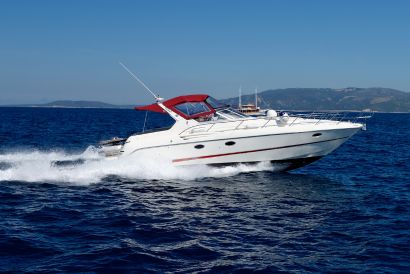Boating is an adventure at any age, but it often becomes a lifestyle for retirees. If you’ve ever considered trying to save up for a boat one day this could be a good read. With a couple of these financial tips, you’ll be well on your way to living your boating dream!

By Dan Coconate
Special to Financial Independence Hub
Retirement is a time for relaxation, adventure, and a well-deserved break from the toils of work. For many, it’s the perfect time for ticking off items on the bucket list and enjoying activities they couldn’t do before, such as boating. Setting sail on serene waters has a draw that’s hard to resist, especially once you’ve reached your golden years, but it can unfortunately be an expensive hobby. With these financial tips, investing in a boat for retirement is within reach.
Why Invest in a Boat?
Investing in a boat can offer several benefits depending on your interests as well as your lifestyle. In many cases, the most common reasons as to why one would invest in a boat is for recreation/leisure, family time, and adventure!
In the financial world, large purchases are seldom one-dimensional. However, they can be gateways to new experiences or investment opportunities. A boat, with its allure of freedom and tranquility, often blinds potential owners to its financial complexities. With a good understanding of your needs and what’s available, you can spend your glory days in luxury and comfort.
Don’t forget that investing in a boat depends greatly on the individual themselves and what they are comfortable in affording. As great as it is to own one, you don’t want it to feel like you’re being submerged by a financial burden especially towards your later years in life. Find something that you can truly afford and go from there.
Understanding the Cost of Ownership
As mentioned above, owning a boat depends greatly on the individual themself and what they can afford. The financial commitments of boat ownership extend far beyond the initial purchase price. From understanding the dos and don’ts of marine craft maintenance to preparing your vessel for foul weather, upkeep can turn the investment into a bottomless expense if not managed wisely.
Here are some common costs that every prospective boat owner should consider:
- Purchase Price: The upfront cost varies widely based on the boat’s type and age.
- Maintenance and Repairs: Regular upkeep, including engine maintenance, hull cleaning, and repairs.
- Docking Fees: Charges for mooring or storing your boat at a marina or docking facility.
- Insurance: Protection against accidents, theft, and natural disasters.
- Fuel: Operational expense that can fluctuate with usage and fuel market prices.
- Safety Equipment: Initial purchase and replacement costs for items such as life jackets, fire extinguishers, and flares.
Understanding these costs is imperative, as they can tally up faster than the wakes behind a speedboat.
Legal and Financial Considerations
There are also key legal and tax-based implications of boat ownership. When considering the various forms of state and federal taxes on a boat’s purchase, operation, and potential resale, the financial burden can become relatively heavy. Annual or biennial fees can add up and make it difficult to ascertain the full price of boat ownership beforehand.
The Market for Boat Resales
Should the time come to part ways with your seafaring companion, you must understand the ins and outs of the resale market. Stay abreast of current trends in the boating industry. Time your sale to coincide with peak demand periods — spring and early summer in many regions — to maximize your boat’s value. Knowing what models and types of boats are in demand can help you position your boat more attractively.
Investing in a boat may seem challenging, but with meticulous planning, financial foresight, and a love for the sea, it can be an asset in your retirement’s grand voyage. Ultimately, you must approach it with the same due diligence as any other major financial decision. By carefully considering these financial tips for investing in a boat for retirement, retirees and boating enthusiasts can invest in life’s grand adventures.
 Dan Coconate is a local Chicagoland freelance writer who has been in the industry since graduating from college in 2019. He currently lives in the Chicagoland area where he is pursuing his multiple interests in journalism.
Dan Coconate is a local Chicagoland freelance writer who has been in the industry since graduating from college in 2019. He currently lives in the Chicagoland area where he is pursuing his multiple interests in journalism.

